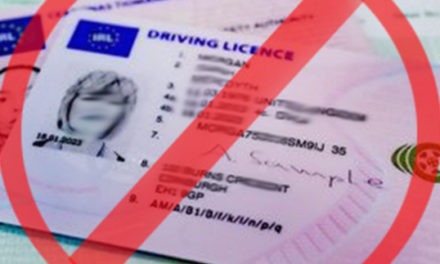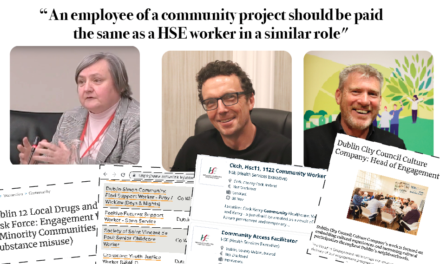David Doran worked until recently as an employment specialist with County Kildare Leader Partnership. He provided a new kind of support service for people living with mental illness who wish to gain employment.
Regardless of a person’s job readiness or personal situation (eg homelessness) David and 40 other employment specialists around the country support people to find work.
The Individual Placement Support (IPS) service they provide has proven a success abroad and is backed by the HSE since a pilot showed its worth in 2017.
At work, David has used his own experience with mental health challenges to assist his clients in gaining employment and moving forward in their recovery. Here, he talks about IPS supports and how they work:
The initiative supports people who are engaged with Community Mental Health Teams to find employment, and support them on their journey to full employment. Or, in many other cases people might be already in employment but might be out on illness because of their mental health conditions, and are linking in with myself to support them on their return to employment.
IPS is funded by the HSE and a host company hosts the service. County Kildare LEADER Partnership host IPS in my case. The local development companies are brilliant because it’s like a wraparound service. So if I’m working with Mary, who has never worked before in her life because of mental illness, I can refer Mary to (someone else in the organisation) for help with her CV, or a women’s group, or a workshop, things that to get her outside and into the community.

– David Doran, former employment specialist with County Kildare LEADER Partnership
The main goal is to find mainstream employment, but we cater for everything else that the client wants to do. It’s individual-based; it’s totally what the client wants. If someone comes to me and they want to find a job working as a postman, we go that road. I started the service during Covid time, so it was quite difficult. But since then, about 120 clients have passed through IPS. About 60 of them have returned to employment, 20 returned to education. Others have gone into, for instance, a CE scheme or social farming.
In the last two years, it’s really taken off and we’ve received more funding to hire more employment specialists. I’m speaking from my experience of my own mental health too. You can tell clients your story of where you came from, how you got here, and what a difference it made for you to return to work and have a purpose.
If someone’s referred to me, I sit down with them and I give them the spiel of what I do, and the different supports that I can provide, for instance linking in with employers, doing interview practice, building CVs, motivation and confidence-building.
NO EXCLUSION
There’s no exclusion here, no matter how ill the client – once they want to return to work, they’re referred to me. There’s no: ‘Well I don’t think you’re ready right now’. For instance, I was working with a client who was a very, very paranoid gentleman. He wanted to find work but he didn’t know how to go about it. This guy couldn’t go outside his door, but eventually we worked with each other on a career plan, step-by-step.
I suggested: ‘Do you want to do some volunteering first? Or social farming?’ So, we got him into some social farming. He spent 12 weeks doing that one day a week. He absolutely loved it. He came out of his shell, he enjoyed being outdoors, and got into horticulture. Now he’s doing a CE Scheme.
He absolutely loves it, he does his three days a week, he gets his qualifications. He said to me: ‘I might come back to you during the summer and we might actually look for mainstream employment’. This is a guy who, the team even said, he wouldn’t come outside his house, wouldn’t answer his phone. But we worked together, we stuck with it. He’s a prime example of someone using other services, returning to IPS, and now he’s ready to go into employment. So the outcomes have been brilliant.
TEACHERS, ACCOUNTANTS TOO
People ask: ‘What kind of jobs are they, warehouse jobs? Menial jobs?’ And yes, they are, but I have also worked with teachers, accountants, with media producers, people high up in tech. It’s a mixed bag of people you’re working with. And returning to work is part of recovery. You say to people when you’re working with them: ‘You’re the captain of your ship. I’m your shipmate, just guiding you along the way, it’s totally up to you where we go with this’.
We try as many different jobs as possible, and if they don’t work out, fine. Let’s move on to the next one. That’s comforting to people. It’s long-term support. It’s great when you don’t really hear from them, because that often means their life is brilliant again. But we do check in with them. There might be people who are gone off the programme two years, but I’ll drop them a text.
We abide by a handbook on IPS, which has its items and principles; that’s brilliant because you can’t sway off. I think that’s what makes it a success as well. An employment specialist has a maximum of 20 clients on a caseload at any given time. That’s what the rules say, because you’re not going to provide a good service to people if you go over that, someone’s going to miss out on something.
NO NEGATIVITY
Thankfully, I haven’t had any negativity. I do say to clients: ‘If you don’t get the job, or if they have an issue regarding mental health or whatever, then it wouldn’t be a nice place to work’. And that sells it for the client. I’ve had employers give guys a couple a chances. You work with people with serious mental illnesses and they could have aggression or serious things going on in their lives, and they (the employers) have been very catering.
It’s catching on. It takes the pressure off the mental health team as well. We hope this year we’ll have a national event in Croke Park. In America, they’re working with people with severe disabilities, physical disabilities, early school leavers, people who would have substance issues.
I’d like to see it spread out beyond the mental health side of things. It is very positive that the funding is there. It’s continuous roll-over funding, it’s embedded in the mental health services. It’s an exciting time to be working in the area. And you feel great because you’re helping someone, it’s very rewarding. – In conversation with Kathy Masterson
WHAT IS: ‘Individual Placement and Support’
Individual Placement and Support (IPS) supports people with mental health difficulties to find work. After over 30 years of research, it is considered the most effective way to support people with mental health conditions to find and maintain the right employment for them.
Currently, 41 IPS employment specialists are work with Community Mental Health Teams (CMHTs) covering all 26 counties. Another 11 IPS employment specialists are to be recruited later this year.
IPS’s unique approach involves integrating the employment specialists into the CMHTs. It has been used in labour markets in many different countries, in various settings, including: community mental health centres, rehabilitation programmes, supportive housing programmes.
In Ireland, IPS employment specialists work in partnership with the person, the employer, the CMHT, and the Local Employment Services.
They will help anyone availing of CMHT services who wishes to work, regardless of their job readiness, or factors such as homelessness, work history, substance abuse, mental health symptoms, a history of violent behaviour, cognition impairment, not adhering to treatment, being engaged by the legal system, and personal presentation.
Some people try several jobs before finding employment they like. Each job is viewed as a positive learning experience. The service helps clients to make a CV, search for a job, prepare for interviews, and supports them along the way. The employment specialists, with permission from clients, make the approach to employers.
The service is advertised in HSE clinics and services. HSE mental health workers can refer people to IPS. The first steps involve three or four sessions. Ideally, the job search will begin then and clients can continue to avail of IPS supports for as long as they need.




